
Dervish
Encyclopedia
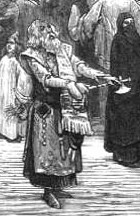
Persian language
Persian is an Iranian language within the Indo-Iranian branch of the Indo-European languages. It is primarily spoken in Iran, Afghanistan, Tajikistan and countries which historically came under Persian influence...
درویش, Darvīsh via Turkish
Turkish language
Turkish is a language spoken as a native language by over 83 million people worldwide, making it the most commonly spoken of the Turkic languages. Its speakers are located predominantly in Turkey and Northern Cyprus with smaller groups in Iraq, Greece, Bulgaria, the Republic of Macedonia, Kosovo,...
, ) is someone treading a Sufi Muslim
Muslim
A Muslim, also spelled Moslem, is an adherent of Islam, a monotheistic, Abrahamic religion based on the Quran, which Muslims consider the verbatim word of God as revealed to prophet Muhammad. "Muslim" is the Arabic term for "submitter" .Muslims believe that God is one and incomparable...
ascetic path or "Tariqah
Tariqah
A tariqa is an Islamic religious order. In Sufism one starts with Islamic law, the exoteric or mundane practice of Islam and then is initiated onto the mystical path of a tariqa. Through spiritual practices and guidance of a tariqa the aspirant seeks ḥaqīqah - ultimate truth.-Meaning:A tariqa is a...
", known for their extreme poverty and austerity, similar to mendicant
Mendicant Orders
The mendicant orders are religious orders which depend directly on the charity of the people for their livelihood. In principle, they do not own property, either individually or collectively , believing that this was the most pure way of life to copy followed by Jesus Christ, in order that all...
friar
Friar
A friar is a member of one of the mendicant orders.-Friars and monks:...
s in Christianity or Hindu/Buddhist/Jain sadhu
Sadhu
In Hinduism, sādhu denotes an ascetic, wandering monk. Although the vast majority of sādhus are yogīs, not all yogīs are sādhus. The sādhu is solely dedicated to achieving mokṣa , the fourth and final aśrama , through meditation and contemplation of brahman...
s.
Etymology
The Persian word darvīsh (درویش) is of ancient origin and descends from a Proto-IranianProto-Iranian
Proto-Iranian, is the reconstructed proto-language of the Iranian languages branch of Indo-European language family, and as such, the ancestor of the Iranian languages such as Persian, Sogdian, Zazaki, Mazandarani, Kurdish and others...
word that appears in Avestan as drigu-, "needy, mendicant". The Iranian word is probably further cognate
Cognate
In linguistics, cognates are words that have a common etymological origin. This learned term derives from the Latin cognatus . Cognates within the same language are called doublets. Strictly speaking, loanwords from another language are usually not meant by the term, e.g...
with the Vedic Sanskrit
Vedic Sanskrit
Vedic Sanskrit is an old Indo-Aryan language. It is an archaic form of Sanskrit, an early descendant of Proto-Indo-Iranian. It is closely related to Avestan, the oldest preserved Iranian language...
word adhrigu-, an epithet
Epithet
An epithet or byname is a descriptive term accompanying or occurring in place of a name and having entered common usage. It has various shades of meaning when applied to seemingly real or fictitious people, divinities, objects, and binomial nomenclature. It is also a descriptive title...
of uncertain meaning applied to several deities. The Vedic word is probably to be analysed as a-dhrigu-, that is "not dhrigu-," perhaps "not poor", i.e. "rich." The existence of this Vedic cognate suggests that the institution of the holy mendicant was as prominent among the ancient Indo-Iranian
Indo-Iranians
Indo-Iranian peoples are a linguistic group consisting of the Indo-Aryan, Iranian, Dardic and Nuristani peoples; that is, speakers of Indo-Iranian languages, a major branch of the Indo-European language family....
people as it has been historically in later Iran in the form of dervish brotherhoods and also in India in the form of the various schools of sannyasis. However, because the etymology of the word is not apparent from the point of view of the modern Persian language, there have been attempts to make the parts of the word interpretable in terms of contemporary words and with reference to Sufic mystical concepts. Dar in Persian
Persian language
Persian is an Iranian language within the Indo-Iranian branch of the Indo-European languages. It is primarily spoken in Iran, Afghanistan, Tajikistan and countries which historically came under Persian influence...
means "a door", so Dervish is said to literally mean "one who opens the doors". The Persian word also gives terms for "ascetic" in some languages, as in the Urdu
Urdu
Urdu is a register of the Hindustani language that is identified with Muslims in South Asia. It belongs to the Indo-European family. Urdu is the national language and lingua franca of Pakistan. It is also widely spoken in some regions of India, where it is one of the 22 scheduled languages and an...
phrase darveshaneh tabi'at, "an unflappable or ascetic temperament".
Religious practice
Many Dervishes are mendicant ascetics who have taken a vow of poverty, unlike mullahMullah
Mullah is generally used to refer to a Muslim man, educated in Islamic theology and sacred law. The title, given to some Islamic clergy, is derived from the Arabic word مَوْلَى mawlā , meaning "vicar", "master" and "guardian"...
s. The main reason they beg is to learn humility, but Dervishes are prohibited to beg for their own good. They have to give the collected money to other poor people. Others work in common professions; Egyptian Qadiriyya
Qadiriyya
The Qadiriyya , are members of the Qadiri Sufi order...
– known in Turkey as Kadiri
Kadiri
Kadiri is a Small town, Mandal and a municipality in the southeastern part of Anantapur district in Andhra Pradesh, India. The Lord Lakshmi Narasimha Swamy Temple is located in this town, and large numbers of Hindu pilgrims visit the Temple throughout the year. The Thimmamma Marrimanu Kadiri is...
– are fishermen, for example.
Some classical writers indicate that the poverty of the Dervish is not merely economic. Saadi
Saadi (poet)
Abū-Muḥammad Muṣliḥ al-Dīn bin Abdallāh Shīrāzī better known by his pen-name as Saʿdī or, simply, Saadi, was one of the major Persian poets of the medieval period. He is not only famous in Persian-speaking countries, but he has also been quoted in western sources...
, for instance, who himself travelled widely as a dervish, and wrote extensively about them, says in his Gulistan
Gulistan of Sa'di
The Gulistan is a landmark literary work in Persian literature, perhaps its single most influential work of prose. Written in 1259 CE, it is one of two major works of the Persian poet Sa'di, considered one of the greatest medieval Persian poets. It is also one of his most popular books, and...
,
-
-
- Of what avail is frock, or rosary,
- Or clouted garment? Keep thyself but free
- From evil deeds, it will not need for thee
- To wear the cap of felt: a darwesh be
- In heart, and wear the cap of Tartary.
-
Rumi writes in Book 1 of his Masnavi
Masnavi
The Masnavi, Masnavi-I Ma'navi or Mesnevi , also written Mathnawi, Ma'navi, or Mathnavi, is an extensive poem written in Persian by Jalal al-Din Muhammad Rumi, the celebrated Persian Sufi saint and poet. It is one of the best known and most influential works of both Sufism and Persian literature...
,
- Water that's poured inside will sink the boat
- While water underneath keeps it afloat.
- Driving wealth from his heart to keep it pure
- King Solomon preferred the title 'Poor':
- That sealed jar in the stormy sea out there
- Floats on the waves because it's full of air,
- When you've the air of dervishood inside
- You'll float above the world and there abide...
Orders
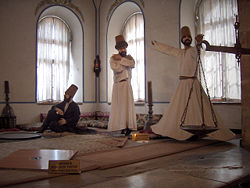
Abu Bakr
Abu Bakr was a senior companion and the father-in-law of the Islamic prophet Muhammad. He ruled over the Rashidun Caliphate from 632-634 CE when he became the first Muslim Caliph following Muhammad's death...
. Various orders and suborders have appeared and disappeared over the centuries. Rifa'iyyah Dervishes spread into North Africa, Turkey
Turkey
Turkey , known officially as the Republic of Turkey , is a Eurasian country located in Western Asia and in East Thrace in Southeastern Europe...
, the Balkans
Balkans
The Balkans is a geopolitical and cultural region of southeastern Europe...
, Iran
Iran
Iran , officially the Islamic Republic of Iran , is a country in Southern and Western Asia. The name "Iran" has been in use natively since the Sassanian era and came into use internationally in 1935, before which the country was known to the Western world as Persia...
, Pakistan
Pakistan
Pakistan , officially the Islamic Republic of Pakistan is a sovereign state in South Asia. It has a coastline along the Arabian Sea and the Gulf of Oman in the south and is bordered by Afghanistan and Iran in the west, India in the east and China in the far northeast. In the north, Tajikistan...
, India
India
India , officially the Republic of India , is a country in South Asia. It is the seventh-largest country by geographical area, the second-most populous country with over 1.2 billion people, and the most populous democracy in the world...
, Afghanistan
Afghanistan
Afghanistan , officially the Islamic Republic of Afghanistan, is a landlocked country located in the centre of Asia, forming South Asia, Central Asia and the Middle East. With a population of about 29 million, it has an area of , making it the 42nd most populous and 41st largest nation in the world...
and Tajikistan
Tajikistan
Tajikistan , officially the Republic of Tajikistan , is a mountainous landlocked country in Central Asia. Afghanistan borders it to the south, Uzbekistan to the west, Kyrgyzstan to the north, and China to the east....
.
Other groups include the Bektashi
Bektashi
Bektashi Order or Bektashism is an Islamic Sufi order founded in the 13th century by the Persian saint Haji Bektash Veli. In addition to the spiritual teachings of Haji Bektash Veli the order was significantly influenced during its formative period by both the Hurufis as well as the...
s, connected to the janissaries
Janissary
The Janissaries were infantry units that formed the Ottoman sultan's household troops and bodyguards...
, and Senussi
Senussi
The Senussi or Sanussi refers to a Muslim political-religious order in Libya and the Sudan region founded in Mecca in 1837 by the Grand Senussi, Sayyid Muhammad ibn Ali as-Senussi. Senussi was concerned with both the decline of Islamic thought and spirituality and the weakening of Muslim political...
, who are rather orthodox in their beliefs. Other fraternities and subgroups chant verses of the Qur'an
Qur'an
The Quran , also transliterated Qur'an, Koran, Alcoran, Qur’ān, Coran, Kuran, and al-Qur’ān, is the central religious text of Islam, which Muslims consider the verbatim word of God . It is regarded widely as the finest piece of literature in the Arabic language...
, play drums or dance vigorously in groups, all according to their specific traditions. Some practice quiet meditation
Meditation
Meditation is any form of a family of practices in which practitioners train their minds or self-induce a mode of consciousness to realize some benefit....
, as is the case with most of the Sufi orders in South Asia
South Asia
South Asia, also known as Southern Asia, is the southern region of the Asian continent, which comprises the sub-Himalayan countries and, for some authorities , also includes the adjoining countries to the west and the east...
, many of whom owe allegiance to, or were influenced by, the Chishti order. Each fraternity
Fraternity
A fraternity is a brotherhood, though the term usually connotes a distinct or formal organization. An organization referred to as a fraternity may be a:*Secret society*Chivalric order*Benefit society*Friendly society*Social club*Trade union...
uses its own garb and methods of acceptance and initiation, some of which may be rather severe.
Whirling
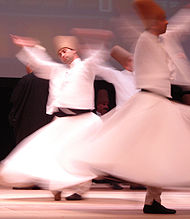
Sufi whirling
Sufi whirling , is a form of Sama or physicaly active meditation which orginated among Sufis, and which is still practiced by the Sufi Dervishes of the Mevlevi order. It is a customary dance performed within the Sema, or worship ceremony, through which dervishes aim to reach the source of all...
that is proverbially associated with Dervishes is best known in the West by the practices (performances) of the Mevlevi
Mevlevi
The Mevlevi Order, or the Mevlevilik or Mevleviye are a Sufi order founded in Konya by the followers of Jalal ad-Din Muhammad Balkhi-Rumi, a 13th century Persian poet, Islamic jurist, and theologian. They are also known as the Whirling Dervishes due to their famous practice of whirling as a form...
order in Turkey, and is part of a formal ceremony known as the Sama. It is, however, also practiced by other orders. The Sama is only one of the many Sufi ceremonies performed to try to reach religious ecstasy
Religious ecstasy
Religious ecstasy is an altered state of consciousness characterized by greatly reduced external awareness and expanded interior mental and spiritual awareness which is frequently accompanied by visions and emotional/intuitive euphoria...
(majdhb, fana). The name Mevlevi comes from the Persian
Persian language
Persian is an Iranian language within the Indo-Iranian branch of the Indo-European languages. It is primarily spoken in Iran, Afghanistan, Tajikistan and countries which historically came under Persian influence...
poet, Rumi
Jalal ad-Din Muhammad Rumi
Jalāl ad-Dīn Muḥammad Balkhī , also known as Jalāl ad-Dīn Muḥammad Rūmī and popularly known as Mevlānā in Turkey and Mawlānā in Iran and Afghanistan but known to the English-speaking world simply as Rumi was a 13th-century Persian Muslim poet, jurist, theologian, and Sufi mystic...
who was a Dervish himself. This practice, though not intended as entertainment, has become a tourist attraction in Turkey.
Historical and political use of the term
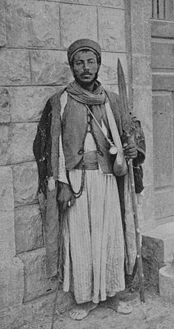
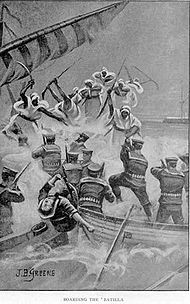
Muhammad Ahmad
Muhammad Ahmad bin Abd Allah was a religious leader of the Samaniyya order in Sudan who, on June 29, 1881, proclaimed himself as the Mahdi or messianic redeemer of the Islamic faith...
in Sudan
Sudan
Sudan , officially the Republic of the Sudan , is a country in North Africa, sometimes considered part of the Middle East politically. It is bordered by Egypt to the north, the Red Sea to the northeast, Eritrea and Ethiopia to the east, South Sudan to the south, the Central African Republic to the...
, Mohammed Abdullah Hassan
Mohammed Abdullah Hassan
Sayyīd Muhammad `Abd Allāh al-Hasan was a Somali religious and patriotic leader...
's 1920 conflict with British forces
1920 conflict between British forces and Somaliland dervishes
The 1920 conflict between British forces and the Dervish State was the fifth and final British expedition against the Dervish forces of Mohammed Abdullah Hassan , the Somali religious leader. The majority of this conflict took place during January 1920. However, the British began preparations to...
in Somalia
Somalia
Somalia , officially the Somali Republic and formerly known as the Somali Democratic Republic under Socialist rule, is a country located in the Horn of Africa. Since the outbreak of the Somali Civil War in 1991 there has been no central government control over most of the country's territory...
, and other rebellions against colonial
Colonialism
Colonialism is the establishment, maintenance, acquisition and expansion of colonies in one territory by people from another territory. It is a process whereby the metropole claims sovereignty over the colony and the social structure, government, and economics of the colony are changed by...
powers.
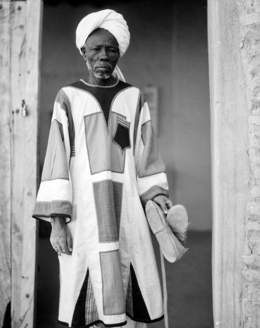
Begging
While commonly the term dervish is used to describe beggars, a differentiation between mendicant Dervishes and common beggars can be made:"While they walk around praising the Lord, anyone according to his own desire may voluntarily drop some coins in it (a kashkulCoco de merThe Coco de Mer , the sole member of the genus Lodoicea, is a palm endemic to the islands of Praslin and Curieuse in the Seychelles. It formerly also was found on St Pierre, Chauve-Souris and Ile Ronde in the Seychelles group, but has become extinct on these islands...
)... a real dervish who wears the proper robe and carries the kashkul does not beg, nor does he make any demands."
See also
- FakirFakirThe fakir or faqir ; ) Derived from faqr is a Muslim Sufi ascetic in Middle East and South Asia. The Faqirs were wandering Dervishes teaching Islam and living on alms....
- QalandarQalandarQalandars are wandering ascetic Sufi dervishes who may or may not be connected to a specific tariqat. They are most prevalent in Central Asia, India and Pakistan, in the latter "qalandar" is also used as a title...
- Warsangeli DaraawiishWarsangeli Daraawiish-The Genesis of the Somali Dervish movement:The Dervish ideal was a nationalistic cause whose primary goal was to integrate Somalis and unite Somali territories under one single centralized administration....
- The Tale of the Four DervishesThe Tale of the Four DervishesThe Tale of the Four Dervishes is a collection of allegorical stories by Amir Khusro written in Persian in the late 13th century....
Qissa Chahar Dervish

